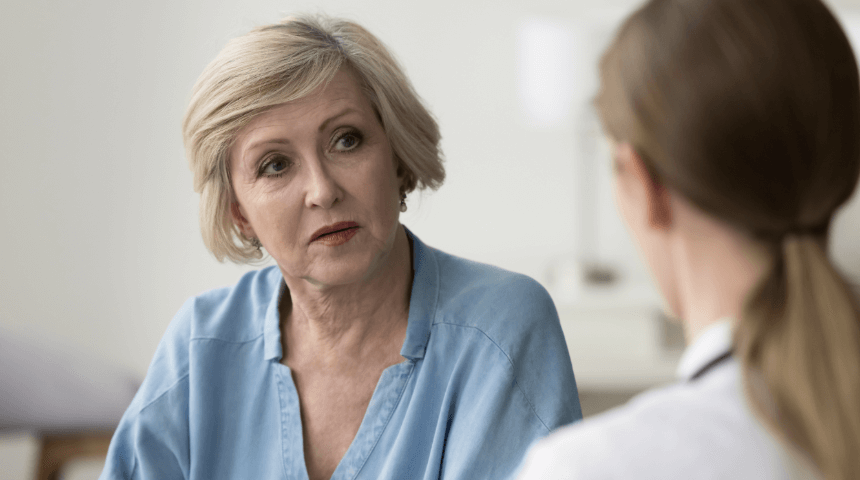Every girl will notice her body changing around the time of her first period. But unwanted changes like coarse, dark hair in unusual places, acne, weight gain and irregular or painful periods may signal a chronic condition called polycystic ovarian syndrome (PCOS), which could lead to infertility, diabetes and other serious health problems.
PCOS is caused by a hormonal imbalance, resulting in a cluster of symptoms — some visible, some not. Visible symptoms include obesity, acne and excessive hair growth, called hirsutism While these visible symptoms can be emotionally and psychologically devastating, invisible symptoms, including ovarian dysfunction and insulin resistance, could damage your physical health, which is why diagnosis and treatment are so important.
Because PCOS is common – about one in 10 women of reproductive age have it — it’s a prime suspect whenever a young woman sees a doctor complaining of irregular periods and showing the triad of visible symptoms – obesity, acne and unwanted hair growth. Tests to determine hormone levels and an ultrasound of the ovaries will confirm the diagnosis.
Hormonal Imbalance
Hormones are the chemical signals produced in various parts of the body to regulate growth, development, metabolism, sexual function and reproduction, among other things. For the female reproductive system to function correctly, specific hormones work in a delicate balance triggering each phase of the menstrual cycle, from the release of an egg by the ovaries to menses — when the thickened lining of the uterus is shed.
This delicate balance is disrupted in women with PCOS, who typically have elevated levels of certain hormones, including:
- Androgens, including testosterone, which kickstart puberty and are responsible for secondary male sex characteristics like facial hair
- Luteinizing hormone (LH), which stimulates ovulation but in excess can have an abnormal effect on the ovaries
- Insulin, which regulates how cells use glucose for energy
With their hormones out of sync, PCOS patients typically experience irregular periods, the expression of secondary male sex traits and insulin resistance – a precursor to diabetes.
Ovarian Dysfunction
PCOS is technically a disorder of the endocrine system, which controls the manufacture and release of hormones. However, because it affects a woman’s reproductive system, it is also a gynecological disorder, causing dysfunction of the ovaries, a pair of small glands on each side of the uterus, where a fertilized egg grows into a fetus.
When a female infant is born, these glands already contain all the precursor eggs she will produce in a lifetime. When she reaches puberty, triggered by hormones called estrogens, the ovaries are supposed to begin releasing a mature egg each month, which, if unfertilized, leads to monthly menstruation. But some women don’t make enough estrogens to release an egg (called ovulation.) Instead, the ovaries may develop many small fluid-filled cysts, which produce androgens, further disrupting the menstrual cycle.
Other Health Factors
One very common symptom of PCOS is insulin resistance – which means the body can’t use insulin effectively, so it builds up, raising the risk of diabetes and also leading to higher levels of androgens (male hormones) like testosterone.
Science has yet to identify the cause of PCOS, but there is evidence that both genetics and obesity play a role. A high percentage of women with PCOS have a close relative who also has it, and about 60% of PCOS patients are obese.
Obesity in and of itself can lead to insulin resistance and type 2 diabetes — although even women of normal weight with PCOS are more likely to develop insulin resistance and diabetes because their bodies produce too much of it.
While diabetes is the biggest long-term health risk for women with PCOS, these dangerous conditions are also more likely:
- High blood pressure
- Cardiovascular disease
- High LDL (“bad”) and low HDL (“good”) cholesterol
- Sleep apnea
- Stroke
- Endometrial cancer
- Breast cancer
- Ovarian cancer
Treating PCOS
Because of the potential for serious health issues, treatment of PCOS should begin as early as possible with both medicine and lifestyle changes (which can be more difficult to establish in older patients.) A dietitian can provide nutritional guidance to create a deficit of 500- to 700 calories a day to lose weight while also encouraging increased and regular physical activity.
Additionally, depending on your fertility goals, your doctor may prescribe drugs like these:
- Clomiphene, which encourages the monthly release of an egg from the ovaries
- Oral contraceptives, which contain estrogen and progestin, regulate menstrual periods and reduce androgen levels
- Metformin, which regulates hormones, promotes ovulation and mitigates insulin resistance
New research also shows the potential for weight loss, hormone regulation and insulin control with the newer GLP-1 class of drugs now on the market to treat diabetes and promote weight loss.
As these medicines and lifestyle changes bring PCOS under control, patients can begin to explore various medical and nonmedical options to deal with aesthetic concerns. For example, prescription acne treatments are widely available, and electrolysis can remove unwanted hair.
With these treatments, symptoms disappear in many women with PCOS.
Choose to Stay in Touch
Sign up to receive the latest health news and trends, wellness & prevention tips, and much more from Orlando Health.
Sign Up





